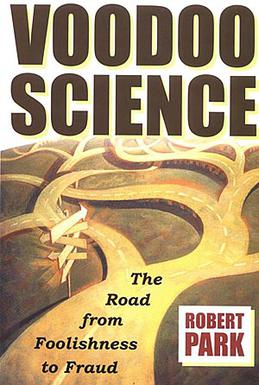Voodoo Science
Voodoo Science: The Road from Foolishness to Fraud is a term coined by physicist Robert L. Park to describe unscientific conclusions masquerading as legitimate science. The term was popularized through Park's 2000 book, "Voodoo Science: The Road from Foolishness to Fraud," which critiques various examples of what he considers to be scientific failures or frauds. Voodoo science encompasses a range of practices, from innocent errors or self-deception to deliberate deceit for personal gain or notoriety. This article explores the concept of voodoo science, its characteristics, examples, and implications for the scientific community and public understanding of science.
Definition and Characteristics[edit | edit source]
Voodoo science refers to research that is presented as based on scientific principles but fails to adhere to the rigorous methodologies and standards that define legitimate scientific inquiry. Characteristics of voodoo science include:
- The use of scientific jargon and claims that sound scientific but lack empirical evidence.
- Reliance on anecdotal evidence or testimonials rather than controlled experiments.
- Lack of peer review or publication in reputable scientific journals.
- Claims that cannot be tested or falsified.
- Proposing mechanisms that contradict well-established scientific laws and theories.
Examples[edit | edit source]
Several examples have been cited by Park and others as embodying voodoo science, including:
- Perpetual motion machines, which claim to operate without energy input, violating the laws of thermodynamics.
- Cold fusion, a claimed nuclear reaction at room temperature that purported to provide an inexhaustible source of energy but failed to be reliably replicated.
- Paranormal phenomena, such as psychic powers or astrology, which claim scientific legitimacy but do not adhere to scientific methods.
- Alternative medicine practices that lack empirical support and are often explained with scientifically implausible mechanisms.
Implications[edit | edit source]
The spread of voodoo science can have several negative implications:
- **Public Misinformation**: It can mislead the public about what is scientifically valid, affecting public policy and personal decisions.
- **Resource Misallocation**: Financial and human resources may be wasted on pursuing unfeasible projects or therapies.
- **Scientific Credibility**: Frequent association of voodoo science with genuine scientific research can erode public trust in science and scientists.
- **Exploitation**: Individuals may be exploited by purveyors of voodoo science through the sale of ineffective products or treatments.
Combating Voodoo Science[edit | edit source]
Combating voodoo science involves promoting scientific literacy, critical thinking, and skepticism. Efforts include:
- Education on the nature of scientific inquiry and the importance of empirical evidence.
- Encouraging public and scientists to ask for evidence and question claims that seem too good to be true.
- Enhancing the peer review process and the accountability of scientific publications.
Conclusion[edit | edit source]
Voodoo science represents a challenge to the integrity of scientific inquiry and public understanding of science. By recognizing and understanding the characteristics of voodoo science, both the scientific community and the public can be better equipped to distinguish between legitimate science and pseudoscience.
Navigation: Wellness - Encyclopedia - Health topics - Disease Index - Drugs - World Directory - Gray's Anatomy - Keto diet - Recipes
Search WikiMD
Ad.Tired of being Overweight? Try W8MD's physician weight loss program.
Semaglutide (Ozempic / Wegovy and Tirzepatide (Mounjaro) available.
Advertise on WikiMD
WikiMD is not a substitute for professional medical advice. See full disclaimer.
Credits:Most images are courtesy of Wikimedia commons, and templates Wikipedia, licensed under CC BY SA or similar.
Contributors: Prab R. Tumpati, MD

